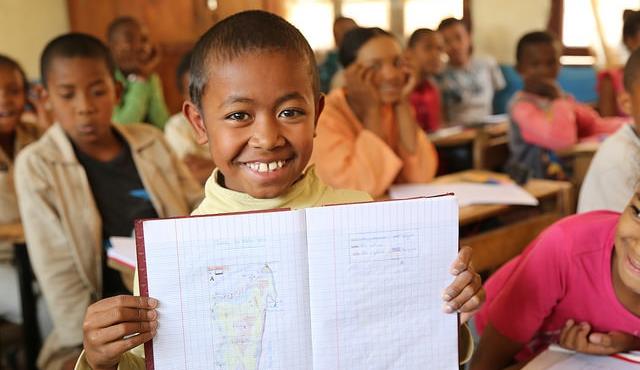By Rolland Rabeson, Secretary-General of the National Education Ministry, Georges Solay Rakotonirainy, Secretary General of the Ministry of Employment, Technical and Vocational Education and Training, and Christian Guy Ralijaona, Secretary-General of the Ministry of Higher Education and Scientific Research, Madagascar

Reinforcing and deepening regional synergies in education will be at the forefront of the Pan-African High-Level Conference on Education (PACE 2018) in Nairobi from 25-27 April. The UNESCO Institute for Statistics (UIS), a key partner of countries across the region, will give a series of presentations on the importance of data for national education planning and for monitoring international commitments enshrined in the Sustainable Development Goal for education (SDG 4).
The UIS is working side-by-side with country partners in a UNESCO-sponsored pilot project called Capacity Development for Education (CapED). The participating countries are: Afghanistan, Cambodia, Democratic Republic of Congo, Haiti, Mali, Madagascar, Mozambique, Myanmar, Nepal and Senegal. The aim of the project is to help these countries develop and strengthen their own abilities to produce quality data.
To this end, since September 2017, our joint team of education ministries, the National Institute for Statistics and other national institutions involved in education data production in Madagascar has been working with the UIS to fulfill these objectives.

We need data to revitalize education policy and planning to build a prosperous future
As a part of the CapED initiative, we have reviewed our education sector plans to find any gaps between our national policy objectives, and our international and regional commitments.
We have also looked at our existing data sources, comparing them to our needs. Based on our particular national context, we have focused on improving several key areas such as age-related data for basic education and school readiness, and the data coverage for technical and vocational education and training (TVET) and higher education.
It has been important to find synergies between our own national data needs and our commitments to SDG 4. So, in consolidating all of the data available we have created a national indicator framework that is relevant to us while meeting our international goals.
Finally, we worked with the UIS to undertake a data quality assessment, which enabled us to look at all of our data sources and ensure that they meet international standards.
We are now entering the final phase of building our education data roadmap: a National Strategy for the Development of Education Statistics (NSDES).
To get there, our strategic objectives are based on a set of recommendations in each of the following areas:
Financial limitations hampering data collection and development
A strong institutional framework is a key element in making sure that our team of education ministries in Madagascar collects and produces quality data with the scientific guidance of our National Institute for Statistics, along with development partners. We know that our technology needs remain high and all three ministries have ongoing requirements for qualified personnel to analyze the information. Moreover, the responsibilities along the data production cycle are not always clear, therefore we need to review our governance framework in this area.
But most crucially, this evaluation revealed that limited financial resources is hampering our ability to produce enough data in a timely fashion. Underfunding of our institutional statistical framework can make planning our educational programs more difficult. It also impacts our ability to meet our SDG 4 commitments.
Addressing this issue would involve creating a separate budget line item for data. This would ensure that funds are available for statistical needs and it would reduce our reliance on external sources of funding. Allocating funds for data in this way would enhance our national sovereignty as quality data – produced independently – should form the basis for all strategic education policy planning decisions.
Consultation with end user key to data uptake
In terms of the collection and classification of data, our partners at UIS have recommended regular, annual consultations with data users in the public and private sectors so that we can identify their needs. This would lead to data creation that is more relevant to the end user with the aim of increasing the rate of uptake.
Greater coordination would help us to put data at the heart of our policy decisions for education. This in turn would lead to more effective policies that target the education needs in-line with national priorities and SDG 4.
Availability of quality education data necessary for evidence-based policy
Finally, the quality of education data is a critical element of our data roadmap, the NSDES. Important elements for this are the accessibility and clarity of the data, as well as their coherence and timeliness. Our evaluation indicates that there are discrepancies between the different types of data produced; bridging this gap – and adhering to international standards – will be key to reinforcing the data quality and ensuring its cross-country comparability.
Asserting the role of the national statistics office would also help. It is also important to implement a national census every ten years to form a baseline reference point. The last time Madagascar conducted a census was 1993. Such a long time-lag can make data projections difficult.
We will consider all of these objectives as we document our NSDES to create a strong data environment for education planning purposes.
In the run-up to PACE 2018, we are proud to be a part of UNESCO’s innovative CapED initiative to improve education data both for national education planning and to meet the objectives of SDG 4.
As African countries meet in Nairobi to work towards our shared agenda for more prosperous, people-centered development, let’s remember that education remains at the heart of building a better future. To achieve the Africa we want, we need quality data to target education policies and to monitor progress.
Leave a comment